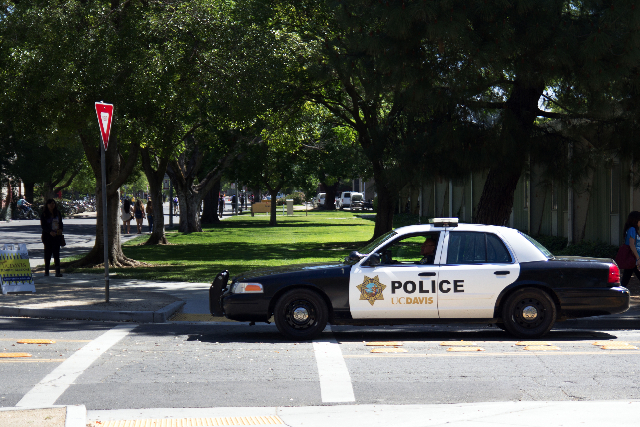Recent investigation by UCSD alumnus details use-of-force cases across UC
Senate Bill 1421, passed in 2019, requires police departments statewide to release records regarding use of force, sexual assault or misconduct within their departments if asked. A recent investigation by Gabe Schneider, an alumnus of UC San Diego and founder of The Triton, a student-run newspaper at UC San Diego, questioned whether UC police departments are releasing those records, as required by law.
Schneider, who used public records laws to compile his data, said that neither UCLA nor UC Berkeley provided responsive records. UC Riverside could not release applicable police records due to an ongoing investigation, while UC Santa Barbara, UC Merced and UC Davis each provided one record.
The record from UC Davis was related to a shooting in 2004 when a man came on the UC Davis campus and attempted to kill his girlfriend. The perpetrator died in the gunfight.
“It took months to get anything back; it seemed way too low to have three records from all years from three campuses,” Schneider said. “[I figured out that there were] around 200-plus instances of use of force around UC campuses, and around 80 involved someone who was injured.”
While Schneider expressed concern about the fact that there were few records available following his request, UC Davis Police Chief Joe Farrow explained that there is a relatively high threshold regarding the parameters in SB 1421, especially since Section A of the law specifies that all police records are confidential unless requested under court order or by a grand jury.
“Notwithstanding Section A, the following are releasable: discharge of a firearm at any person by a police officer, an incident with use of force by a police officer resulting in death or great bodily injury […] or any incident related to a sustained finding released by a law enforcement agency involving sexual assault or dishonesty,” Farrow explained. “That’s a real threshold. At the end of the year, I still am required to notify the Department of Justice about all use of force that applies to the parameters.”
According to Farrow, the law can also apply retroactively, although there was initially confusion about that after it passed.
“There was a little controversy when it first came out, because there were people who felt that it only applied from the day it was passed,” Farrow said. “Some departments released everything from the very beginning and some didn’t.”
Farrow stressed the importance of transparency between police and the communities they are in, describing the implementation of the Police Accountability Board (PAB) at the university. PAB was created in 2015, partially in response to an incident where police officers used pepper spray against student protestors at UC Davis in 2011.
Mikael Villalobos, associate chief diversity officer in the Office of Community Relations at UC Davis, is on the board.
“We are an independent body but we do have a healthy working relationship with the police department,” Villabolos said. “Chief Farrow works with us and that informs the work we do with PAB, especially within the context of civilian oversight.”
Complaints about police department behavior are taken up by PAB, which is composed of students, staff members and faculty to allow for maximum input. UC Davis is the only campus to have such a board. UC President Janet Napolitano’s police task force report, released in 2019, recommended the creation of a similar program on other campuses.
“These independent advisory boards can be helpful in identifying needed changes in police practices and training and providing an important forum to bring stakeholders together,” the report said. “In order to carry out their work, these independent advisory boards should have access to all publicly available reports, audits or data involving their respective police departments and their operations and should meet regularly with their campus community.”
The task force report also noted that complaints about UC Police Department behaviors decreased by 24% between 2016 and 2017, yet concerns remain among students about increased transparency. Some have called for the campus police to be disarmed, for example.
But UCPD remains critical, the report said, especially with “threats being made to individuals on campus.” Due to these concerns, the report added, the UCPD owes students a “heightened standard of care.”
The report further revealed that individuals on campus often don’t know how to file complaints or are uncomfortable contacting the police directly about their concerns. It cited the need for better communication about these efforts and for the existence of independent advisory boards to ensure transparency in interactions among officers, students and other community members.
Written by: Rebecca Bihn-Wallace — campus@theaggie.org









